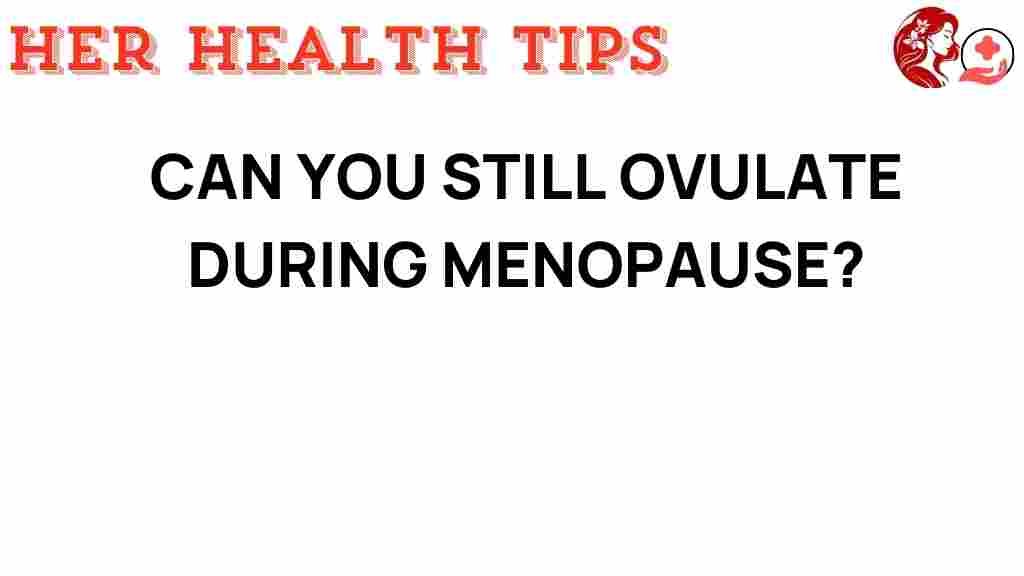Unraveling the Mystery: Can You Still Ovulate During Menopause?
Menopause is a significant phase in a woman’s life, often accompanied by various physical and emotional changes. As women transition through this stage, many questions arise regarding their reproductive health, particularly concerning ovulation. Understanding whether ovulation occurs during menopause is crucial for women who are navigating this complex phase of life. In this article, we will delve into the relationship between ovulation and menopause, exploring the hormonal changes involved, fertility implications, and the symptoms that may arise.
Understanding Menopause and Its Phases
To grasp the concept of ovulation during menopause, it is essential to understand what menopause entails. Menopause is defined as the time in a woman’s life when menstrual cycles cease permanently, marking the end of her reproductive years. This natural biological process typically occurs between the ages of 45 and 55, although individual experiences may vary.
- Perimenopause: The transitional stage leading up to menopause, lasting several years, where hormonal changes begin to occur.
- Menopause: Officially diagnosed after 12 consecutive months without a menstrual period.
- Postmenopause: The phase following menopause, where symptoms may continue, but ovulation no longer occurs.
The Role of Hormonal Changes
During perimenopause and menopause, significant hormonal changes take place in a woman’s body. The key hormones involved in the menstrual cycle are:
- Estrogen: A hormone that helps regulate the menstrual cycle and supports ovulation.
- Progesterone: Produced after ovulation, it prepares the uterus for a potential pregnancy.
- Follicle-stimulating hormone (FSH): Stimulates the ovaries to produce eggs; levels increase during menopause.
- Luteinizing hormone (LH): Triggers ovulation; levels may fluctuate during perimenopause.
As women age, the ovaries gradually produce less estrogen and progesterone, leading to irregular cycles and eventually stopping ovulation altogether.
Can You Ovulate During Menopause?
The straightforward answer is that ovulation typically ceases during menopause. However, it is essential to note that during perimenopause, some women may still experience ovulation. Here’s a breakdown of the likelihood of ovulation during different stages:
- During Perimenopause: Women may experience irregular periods and occasional ovulation. Some may even conceive during this time.
- During Menopause: Once a woman has not had a period for 12 consecutive months, ovulation is no longer possible.
- Postmenopause: Ovulation does not occur, and fertility is significantly decreased.
Symptoms of Menopause and Ovulation
As women approach menopause, they may notice various symptoms due to hormonal fluctuations. These symptoms can include:
- Hot flashes and night sweats
- Irregular periods
- Mood swings
- Vaginal dryness
- Sleep disturbances
Some women might continue to experience ovulation-related symptoms, such as ovulatory pain (mittelschmerz) or breast tenderness, during perimenopause. However, these symptoms can be confused with the general symptoms of menopause.
Fertility and Age: What to Expect
Fertility declines with age, and this decline is often marked by the onset of perimenopause. Understanding the relationship between age and fertility is vital for women who may want to conceive. Here’s what to consider:
- Age Factor: Women in their 40s may still conceive, but the chances diminish significantly as they approach menopause.
- Health Factors: Overall reproductive health, including conditions like polycystic ovary syndrome (PCOS) or endometriosis, can affect fertility.
- Consultation: Women considering pregnancy at an older age should consult healthcare providers for personalized advice and fertility assessments.
Step-by-Step: Understanding Your Cycle During Perimenopause
If you’re experiencing irregular cycles during perimenopause, it’s essential to track your cycle to determine if and when ovulation occurs. Here’s a step-by-step process:
- Track Your Menstrual Cycle: Keep a record of your periods, noting the length and any irregularities.
- Monitor Symptoms: Pay attention to symptoms that may indicate ovulation, such as changes in cervical mucus or mid-cycle pain.
- Use Ovulation Kits: Over-the-counter ovulation predictor kits can help detect the surge in LH that signals ovulation.
- Consult a Doctor: If you have concerns about your menstrual cycle or fertility, seek advice from a healthcare provider.
Troubleshooting Tips for Menopause Symptoms
Managing symptoms during menopause can be challenging. Here are some troubleshooting tips to help alleviate discomfort:
- Nutrition: Maintain a balanced diet rich in fruits, vegetables, and whole grains to support overall health.
- Exercise: Regular physical activity can reduce symptoms like hot flashes and improve mood.
- Hydration: Drink plenty of water to combat dryness and improve skin health.
- Relaxation Techniques: Practices such as yoga, meditation, or deep breathing can help manage stress and mood swings.
- Hormonal Therapy: Discuss with your doctor the benefits and risks of hormone replacement therapy (HRT) for managing severe symptoms.
Conclusion: Embracing Change in Women’s Health
Understanding the relationship between ovulation and menopause is crucial for women navigating this natural phase of life. While ovulation typically ceases with menopause, it can still occur during the perimenopausal stage, and women should be aware of their reproductive health. Hormonal changes play a significant role in this transition, affecting not only fertility but also overall well-being.
It’s essential to stay informed about the symptoms of menopause, the implications for fertility, and the steps you can take to manage this transition effectively. By taking charge of your reproductive health and consulting healthcare professionals as needed, you can navigate menopause with greater confidence and understanding.
For more information on women’s health and menopause, visit this resource.
If you have any questions or need further clarification about your reproductive health during menopause, do not hesitate to reach out to your healthcare provider.
This article is in the category Reproductive and created by HerHealthTips Team
